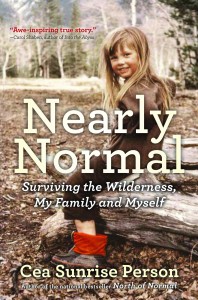Nearly Normal: Surviving the Wilderness, My Family and Myself
A book review by Rebecca Wood Barrett
Cea Sunrise Person’s second memoir, Nearly Normal: Surviving the Wilderness, My Family and Myself, is a follow-up to her first book North of Normal. She cracks open her past, and events that have not been revealed before, to take us on her life’s journey to determine what normal is, how she can achieve normality, and why her counter-culture family was so abnormal.
 But why search for normality? Isn’t it better to embrace our quirks, our foibles, our eccentricities? In Nearly Normal, the typical idea of a normal childhood is held up to a stark light and sharply defined as something quite the opposite of Person’s own unusual childhood. One in which she was loved, but left to her own devices. She was a free-range kid. A kid who was not protected. A kid who was exposed to many cruelties, neglect, and abuse. In this context, it’s easy to understand how the idea and state of normal becomes a lifelong pursuit, a holy grail for a smart, resilient and deeply traumatized woman.
But why search for normality? Isn’t it better to embrace our quirks, our foibles, our eccentricities? In Nearly Normal, the typical idea of a normal childhood is held up to a stark light and sharply defined as something quite the opposite of Person’s own unusual childhood. One in which she was loved, but left to her own devices. She was a free-range kid. A kid who was not protected. A kid who was exposed to many cruelties, neglect, and abuse. In this context, it’s easy to understand how the idea and state of normal becomes a lifelong pursuit, a holy grail for a smart, resilient and deeply traumatized woman.
Person was raised in the wilderness of central Alberta by her young mother Michelle, and her grandparents, Grandma Jeanne and Papa Dick. They lived in canvas tipis, hunted game for food, and had little contact with the outside world, other than curious visitors who spent short periods at their wilderness camp.
By the time Person is a young teen, she and her mother have the left the camp for Calgary. Young Cea attends public school and has her own friends—friends that help her gauge what normal is. Still, Person craves escape from the poverty and bizarre behaviour of her mother, and when the opportunity to pursue a modelling career arises at thirteen, she leaps at the chance.
Fast-forward two decades, and Person is struggling with a failed second marriage, a business that is consuming her soul, the much-anticipated birth of her first child, her mother’s cancer, and resentment, anger and confusion about her past. She bravely picks over terrible childhood memories to try and measure the normality of her choices in the present. Perhaps her greatest anxiety is how to reconcile her mother’s culpability, as someone who has always loved her, but could not provide a foundation of life-skills, or set boundaries, or protect her daughter from predators.
 Many of Person’s choices in life are made in direct opposition to her family’s behaviour and ideals. In some situations this holds her in good stead, and she avoids the typical drug-taking and wild partying of a model’s life. On the other hand, the lack of a normal foundation causes deep depression, and leaves her on constantly shifting ground. Person realizes, “Rather than starting out whole and unravelling, my unprocessed past had slowly closed around me until I was left with nowhere to run. Now, immobilized, I was forced to look at myself and see the truth.”
Many of Person’s choices in life are made in direct opposition to her family’s behaviour and ideals. In some situations this holds her in good stead, and she avoids the typical drug-taking and wild partying of a model’s life. On the other hand, the lack of a normal foundation causes deep depression, and leaves her on constantly shifting ground. Person realizes, “Rather than starting out whole and unravelling, my unprocessed past had slowly closed around me until I was left with nowhere to run. Now, immobilized, I was forced to look at myself and see the truth.”
Nearly Normal is told in a leaping chronology, skipping to various points between the early ‘70’s and 2014. Despite the jumps, I never felt unmoored or confused. The style surely helps the reader to empathize with the way Person’s harrowing memories rise unbidden, and how so many that are hidden must necessarily be unburied, in order for her to reclaim her sense of worth, and forgive the family who was anything but normal.
Rebecca Wood Barrett is a writer and filmmaker living in Whistler, BC.
As part of the Spring Reading Series, author Cea Sunrise Person appears at the Friday, May 5th Open Lives event at the Fairmont Chateau Whistler at 7 p.m. She will be joined by memoir writers Grant Lawrence, Steph Jagger and Paul Shore. Tickets available now www.whistlerwritersfest.com
